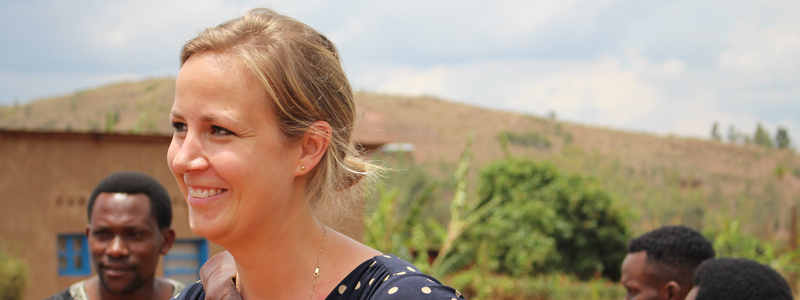A Global Focus
Phaedra Henley’s passion for global health and education has taken her from the campus of Western University to Rwanda where she oversees a master’s program at the University of Global Health Equity
By Jennifer Parraga, BA’93
Have you ever been to Rwanda?” the voice on the other end of the Skype call asked.
That voice belonged to Phaedra Henley, BMSc’07, MES’09, PhD’14, a quadruple threat with respect to major achievements from Schulich Medicine & Dentistry, who now is the Assistant Director of the Master of Science in Global Health Delivery program at the University of Global Health Equity (UGHE) in Rwanda.
“It’s incredible here,” she said. “The country is beautiful and they have made remarkable strides with health and health care systems. I had heard so many good things about the country before I arrived, but I didn’t expect it to feel like home so quickly.”
Henley is now contributing to those positive changes in Rwanda through her role with UGHE. The master’s program is rooted in the principles of global health equity, epidemiology, global health policy, management, leadership, as well as in One Health – the investigation of the links between the health of humans, animals and the environment.
Henley’s own interest in the environment and its impact on human health started at an early age when she worked at the Royal Botanical Gardens in Hamilton, Ontario. Planning environmental programming for school-aged children and managing a summer camp leadership program fostered her commitment to environment issues.
She took that passion with her as she pursued her bachelor of medical sciences degree. The plan in the back of her mind was medicine. That all changed, however, when she took an environmental pathology course that studies the link between the pathology of disease and the environment.
A master’s focused on the environment and sustainability followed, broadening Henley’s understanding of the drivers of human health. Meanwhile, the unrelenting mentorship she received from faculty, including Jack Bend, PhD, and Charlie Trick, PhD, enriched her commitment further and became a launching point to an unexpected future.
During an internship in Salt Spring Island, British Columbia, during her master’s program, Trick asked Henley to participate in an ecosystem health project in Lake Naivasha, Kenya. The plan was for Henley to explore the relationship between health, stress and exposure to environmental contaminants in this developing community.
It was the perfect fit for the young environmentalist. The research ended up serving as the foundation for her PhD research and was expanded to include two Indigenous communities in Canada – Walpole Island and Attawapiskat First Nations.
Henley’s research has been commended not only for the important results it produced, but as well for the collaborative and thoughtful approach taken. She initiated and took the often-missed steps to work closely with community leaders to design research questions, collect data and help in the process to design practical solutions once the data was collected and analyzed.
“This type of communitybased study relies on an active partnership between the investigators and the community. The overarching
goal of an ecosystem health project is sustainability and you can’t create practical solutions in the community without knowing what’s appropriate in the community.” —Phaedra Henley, BMSc’07, MES’09, PhD’14
“This type of community-based study relies on an active partnership between the investigators and the community,” Henley said. “The overarching goal of an ecosystem health project is sustainability and you can’t create practical solutions in the community without knowing what’s appropriate in the community.”
Henley would spend two-and-a-half more years completing a postdoctoral fellowship at Western, during which she developed a proposal and taught the curriculum for the Master of Management of Applied Sciences Program in Global Health Systems in Africa, which is based at Western.
It was during this time that Henley developed an interest in curriculum development and teaching, and when she became aware of the UGHE. She jumped at the opportunity to be part of the university and to contribute to their fledgling program.
“They are doing really impressive work,” said Henley, “and this was the perfect time in my life to do something like this and really dedicate time to growing the program.”
Henley oversees the entire Master of Science in Global Health Delivery program in Rwanda and is responsible for admissions, curriculum planning and strategic development.
The professional master’s program, which graduated its second class in June 2018, is modelled after a similar program at Harvard University. Students are exposed to the principles of global health and learn about policy and leadership from world renowned experts from institutions around the world.
Comfortably rooted in Rwanda, Henley is firmly committed to the program’s development and the continued expansion of UGHE. She remains forever grateful for her years at Schulich Medicine & Dentistry. “Western will always have an important place in my heart,” she said. “I had incredible mentors, studied great programs, and the experience has led me to where I am today. I feel very fortunate for all my Western experiences, and I remain closest to those friends that I met in nine lower in Saugeen-Maitland Hall, 15 years ago.”









